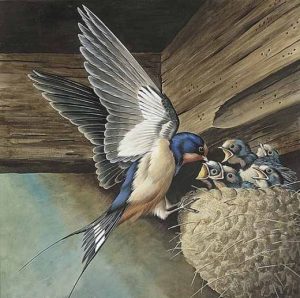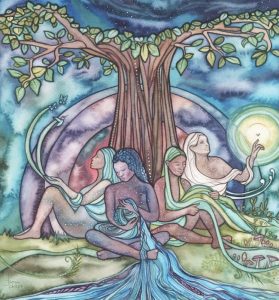 The Columbia City Yoga on-line Moving into Meditation classes met this morning. On this Mother’s Day we explored widening our kinship with others. We contemplated the many who have nurtured and loved us. We imagined the many forms of ancestral inheritance we carry in our lives today. We also contemplated what we would be offering others as ancestors-to-be.
The Columbia City Yoga on-line Moving into Meditation classes met this morning. On this Mother’s Day we explored widening our kinship with others. We contemplated the many who have nurtured and loved us. We imagined the many forms of ancestral inheritance we carry in our lives today. We also contemplated what we would be offering others as ancestors-to-be.
We drew inspiration from Susan Moon’s essay Grandmother Mind. Susan offers a creative and eloquent exploration of the many meanings of honoring our mothers, grandmothers, great-grandmothers. She poses questions about who we consider to be our kin. Finally she shares her own experience of grandmothering under the challenging conditions of pandemic imposed isolation. Susan is an accomplished writer, editor and teacher in the Soto Zen tradition. Her compassion and humor shine in her writings.
We heard Joy Harjo’s beautiful poem Remember. Her lyrical lines ask us to remember our human and more than human ancestors. The repeating evocation to re-member seems to affirm our wholeness and inter-being.
Today many people are observing Mother’s Day. One of the traditional teachings on compassion is to treat every sentient being as if they were your mother. And yet many of us don’t know their mothers or have mothers who were not always able to express compassion and love.
We can take a few moments to reflect on our own inspirations of love and compassion. Who is that person for whom you can feel love freely and wholeheartedly? Who are the people who have accepted, loved and nurtured you? Who are the people that modeled compassion, equanimity, patience and wisdom for you? This contemplation can help us to take a broader, longer view of how love and compassion form a fabric woven by those who came before us and those who will survive us.
Many cultures celebrate and honor their mothers and their ancestors. Meditation teacher and author Susan Moon writes:
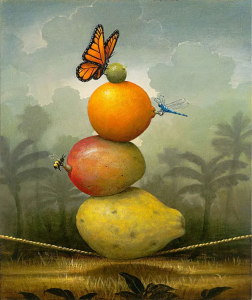 We are all made of the ancestors who came before us, those who bore us and those who bore the ones who bore us, all the way back through the generations to Great-Grandmother and Great-Grandfather Amoeba. Some of our ancestors may not have been admirable people, but we come from them, too, whether we like them or not. People who are adopted may not know who their blood ancestors are, but we come not only from blood ancestors, but also from the people who raised us, who taught us to look both ways before we crossed the street and how to tie our shoes.
We are all made of the ancestors who came before us, those who bore us and those who bore the ones who bore us, all the way back through the generations to Great-Grandmother and Great-Grandfather Amoeba. Some of our ancestors may not have been admirable people, but we come from them, too, whether we like them or not. People who are adopted may not know who their blood ancestors are, but we come not only from blood ancestors, but also from the people who raised us, who taught us to look both ways before we crossed the street and how to tie our shoes.
People who live closer to the earth have a very wide kinship with the world. They call on all relations and practice reciprocity upon taking from the natural world. Imagine, who might be your tree ancestors, river ancestors, mountain ancestors? Who might be your four-footed, winged, water being ancestors?
Consider those ancestors, those beings from who you have inherited so much of who and what you are today. What would our world look like if we honored all our relations? What would our world look like if we lived as ancestors-to-be? Our thoughts words and deeds might be inspired by what 13th century Japanese Zen Master Dogen referred to as “grandmother mind.” Robai-shin, grandmother mind, is the mind of great compassion. Susan Moon writes:
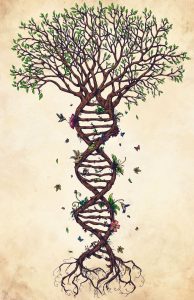 In his “Instructions for the Zen Cook,” Dogen says that monks should have the spirit of parents or grandparents who, “without regard for whether they themselves are cold or hot, shade or cover the child.” . . . If a young male monk can develop grandmother mind, then a person of any age, gender, and social status can develop it. You don’t have to be a grandmother to give your coat to someone shivering in the cold. . . . Grandmother mind is simply a figure of speech. Even grandfathers can have grandmother mind.
In his “Instructions for the Zen Cook,” Dogen says that monks should have the spirit of parents or grandparents who, “without regard for whether they themselves are cold or hot, shade or cover the child.” . . . If a young male monk can develop grandmother mind, then a person of any age, gender, and social status can develop it. You don’t have to be a grandmother to give your coat to someone shivering in the cold. . . . Grandmother mind is simply a figure of speech. Even grandfathers can have grandmother mind.
I invite you to take a few deep breaths and let them out slowly. As you feel your body breathing see if you can relax with the inflow, relax with the outflow. Be aware of your whole body here, breathing. You can travel your awareness through the body and sense all those parts of you that come from your ancestors. You might even imagine the tiniest particles you’ve inherited from the stars. Ancestral lands, plants and animals are part of you. Their energies live in your body, cells and influence DNA. Take some time to reflect on who and where you’ve come from. You can think of your human family and more than human relations.
Now once again let’s turn to imagination and memory. Recall a being, a human or more than human being, who touches your life with grandmother mind: The mind of compassion and wisdom and heart that enables you to f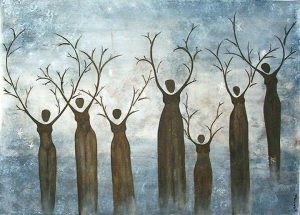 eel accepted, seen and heard. Perhaps it is an ancestor who brought peace to conflict or healing to the sick, sustenance to those in need. Visualize this being as vividly as you can. What wisdom teaching do they bring to your heart? If there is silence, you can rest in the open space of awareness. Perhaps it was a place in which you could feel belonging, a place where you could feel a part of life’s inter-being. Take some time to open your heart to the wisdom that surfaces. You might sense or visualize particular lands and waters: mountains, forests, prairies or deserts; lakes and rivers, bays, wetlands or oceans. Perhaps it is a four footed, winged or scaled creature that inspires you with their qualities. Visualize this being as clearly as you can. How do they inspire your spirit?
eel accepted, seen and heard. Perhaps it is an ancestor who brought peace to conflict or healing to the sick, sustenance to those in need. Visualize this being as vividly as you can. What wisdom teaching do they bring to your heart? If there is silence, you can rest in the open space of awareness. Perhaps it was a place in which you could feel belonging, a place where you could feel a part of life’s inter-being. Take some time to open your heart to the wisdom that surfaces. You might sense or visualize particular lands and waters: mountains, forests, prairies or deserts; lakes and rivers, bays, wetlands or oceans. Perhaps it is a four footed, winged or scaled creature that inspires you with their qualities. Visualize this being as clearly as you can. How do they inspire your spirit?
How does this ancestor inspire you as an ancestor-to-be? Imagine this inspiration, this inheritance of compassion, love and wisdom is a part of you. Notice how it feels to accept this wisdom or these healing qualities or these visions. Know that this remembrance is a part of you. Perhaps a part that you will offer others – even future generations – with your own grandmother mind. You can reflect for a few moments what you as an ancestor-to-be will bequeath to others.
We’ll close with Joy Harjo’s poem, Remember:
Remember the sky that you were born under,
know each of the star’s stories.
Remember the moon, know who she is.
Remember the sun’s birth at dawn, that is the
strongest point of time. Remember sundown
and the giving away to night.
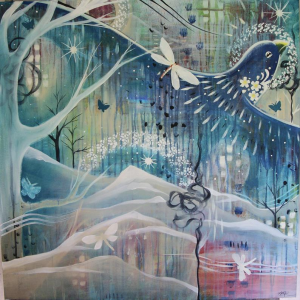 Remember your birth, how your mother struggled
Remember your birth, how your mother struggled
to give you form and breath. You are evidence of
her life, and her mother’s, and hers.
Remember your father. He is your life, also.
Remember the earth whose skin you are:
red earth, black earth, yellow earth, white earth
brown earth, we are earth.
Remember the plants, trees, animal life who all have their
tribes, their families, their histories, too. Talk to them,
listen to them. They are alive poems.
Remember the wind. Remember her voice. She knows the
origin of this universe.
Remember you are all people and all people
are you.
Remember you are this universe and this
universe is you.
Remember all is in motion, is growing, is you.
Remember language comes from this.
Remember the dance language is, that life is.
Remember.

